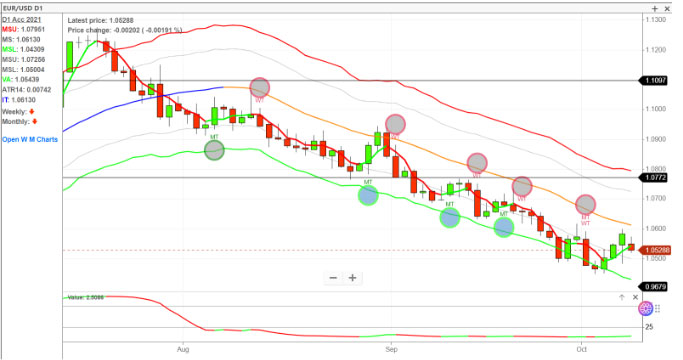Investing can seem like a daunting task due to the multitude of available trading strategies, including forex and options. However, armed with the proper knowledge, you can confidently make trading decisions that have the potential to generate significant profits.

If you are contemplating investing in forex or options, it is crucial to understand the distinctions between the two. This article will explore the top five differences between forex and options, equipping you with the knowledge to make an informed choice.
The question on everyone's mind when it comes to investment is which is more profitable: forex or options?
Forex involves the buying and selling of various currencies from around the world, while options are contracts that grant the buyer the right, but not the obligation, to purchase or sell an asset at a specific price and time.

While both forex and options can be lucrative, the profitability depends on the market and the extent to which you comprehend the strategies involved.
Consider the following essential points:
• Forex offers the potential for high profits, but also carries a higher risk due to its unpredictable nature.
• Options afford greater control over the outcome, allowing you to decide whether to execute the option.
• Forex trading entails continuous monitoring and rapid decision-making, while options trading is more structured and predictable.
• The profitability of forex depends on market and economic conditions, while the profitability of options depends on the underlying asset and market conditions.
• Forex is a 24/7 market that provides numerous profit opportunities but demands more time and effort.
• Options have limited risk and lower entry costs, making them an excellent option for novices.
• Adequate comprehension and research are critical before deciding which of the two, forex or options, is more profitable for you.

Similarities Between Forex and Options Trading
Before deciding between forex and options trading, it is important to recognize that they share several key similarities.
Basic trading principles, such as fundamental analysis and supply and demand zones, are applicable to both markets. Leverage is employed in both forex and options trading, allowing traders to transact with more assets than they could ordinarily afford.
Ninety-five percent of retail traders use margin when trading forex currency pairs or options contracts. Leverage can be a valuable tool when everything is proceeding smoothly, but it can also be a trader's worst enemy.
However, you can manage leverage effectively through thorough risk management.
Both markets have a low barrier to entry, thanks to technological advancements and global competition that have reduced trading costs. Traders can now enter the market with just the spread, without any commissions.
The average spread for the top brokers on EUR/USD is approximately 0.5 pips, which equates to approximately $5 per trade for one lot of EUR/USD. However, commissions are still charged for options trading, with most competitive brokers charging around $1 per contract.
Both markets offer opportunities to profit in all market environments by trading both the buy and sell sides. Traders can benefit from both bullish and bearish markets.
While both markets involve inherent risks, options contracts provide numerous methods to buy and sell based on risk and analysis.
When it comes to trading, there are notable distinctions between forex and options. To determine which one is suitable for you, consider the following crucial points.

Forex involves the buying or selling of underlying assets directly, also known as spot trading. On the other hand, options trading is centred around the buying and selling of contracts that speculate on the underlying asset's price movement. These contracts are referred to as derivatives, as they do not grant ownership of the underlying asset. This difference enables traders to use strategies exclusive to options trading that are not available in forex or normal shares.
Forex trading is available around the clock, five days a week, while options trading is only accessible during normal market hours from Monday to Friday, 9.30 am to 4pm EST. Even though the forex market closes over the weekend, it operates 24 hours a day, providing ample trading opportunities globally. During periods when the markets are closed, traders may encounter sudden price fluctuations due to updates such as new global market developments, company announcements, changes in delta of the options, or underlying stock price movements. This often results in opening market volatility and beginners panicking, closing out their positions, and causing price gaps. In contrast, the highly liquid and continuously flowing forex market experiences rare price gaps even during significant monthly economic data releases, such as the NFP.

Liquidity is different between the two
One of the significant differences between forex and options is their liquidity. Forex is the most liquid market, allowing traders to quickly find buyers or sellers to enter or exit trades with ease. In contrast, options contracts involve settling with others willing to take on the risk of underwriting. Depending on the contract, the number of market participants may be limited, making options illiquid. Nonetheless, most options contracts are easy to liquidate when trading blue chip stocks.
Another difference is that options have an expiration date, while forex does not. Holding onto an options contract for too long can result in losses due to the time limit. Unlike with forex and stocks, where traders can hold onto the asset for as long as needed, options traders must be accurate within the timeframe of the contract. However, this feature also presents opportunities for profit, such as selling the contract ahead of expiration when it is trading in the money.
Options also have implied volatility, which affects their price. Lower implied volatility results in a higher option price, indicating greater risk/reward potential. The price of an option is determined by the difference between the current market price of the underlying security and the option's strike price. Implied volatility influences the option price, with lower implied volatility leading to a lower price and higher implied volatility resulting in a higher price. This is a common method of trading options.






